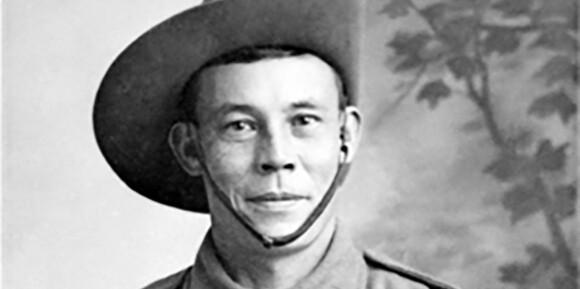This week Middle School staff and students have had the opportunity to reflect on the life of Old Carey Grammarian George Richard Taylor at the Anzac Day Assembly and a Gallipoli campaign veteran Billy Sing (pictured) in Middle School chapel services.
World War I Light Horse veteran Private William Edward Sing was born on 2 March 1886 on a farm near Clermont, Queensland, 945 km north of Brisbane on Gangalu tribal country. His dad was from Shanghai, China and his mum was from Staffordshire, England, and he had two sisters.
William, who preferred to be known as Billy, attended Clermont State School and after school rode horses throughout the district to deliver vegetables and milk. After finishing school at Year 8, Billy worked as a timber cutter, herded cattle and sheep and cut sugarcane. He was a gifted cricketer and an excellent shot, winning prizes each year at the Proserpine Rifle Club.
Billy signed his enlistment papers on 24 October 1914, two months after the outbreak of World War I. Billy experienced racism throughout his whole life due to his Asian ancestry, and at the time, it was uncommon for anyone of non-European background to be accepted into the Australian military forces. It was a deliberate oversight by a recruitment officer that allowed him in. Billy proved this prejudice unfounded and eventually became one of Australia's best snipers.
After a brief period of training in Brisbane, Billy was allocated to the A Squadron of the Fifth Light Horse regiment. Placed on the ship the Star of England, Billy set sail for Egypt five days before Christmas 1914, before heading to Turkey in May 1915. It was here that Billy was given the responsibility to protect allied troops struggling to hold the frontline trenches from being taken by Turkish forces defending their homeland.
Billy was a proficient sniper and was ordered to select and maintain positions that enabled a clear view of the opposing side and to use lethal force to stop troops advancing. To help the ANZAC snipers maintain their focus, other soldiers accompanied them, providing a second set of eyes and ears to identify targets. In early August, Billy and a spotter – Queensland Trooper Tom Sheehan – returned to a vantage point that had been used for several days. A Turkish sniper watching the area detected movement and fired. The bullet passed through Tom’s telescope, end to end, damaging his hands and hitting his mouth before deflecting into Billy’s right shoulder. Despite their injuries, both had to suffer until nightfall when they could struggle back into the Australian trenches and seek medical attention. The severity of Tom’s injuries meant he was evacuated from Gallipoli and returned to Australia. Billy refused to leave and risk the safety of all those who remained in the trenches, but it was a week before Billy was physically and psychologically able to return to the front line.
Billy’s exceptional courage did not go unnoticed. In 1915, Allied Commander General Birdwood issued an order announcing his compliments: Billy was Australia’s best sniper on the Peninsula and had a direct impact on limiting opposing troop movements. When the British High Command acknowledged ordered a complete withdrawal from the Peninsula, Billy continued while numbers defending the trenches steadily decreased. After Billy was ordered off the Peninsula and returned safely to Egypt, the Commander of the Allied forces, Sir Ian Hamilton, on 10 March 1916 ensured Billy was awarded the Distinguished Conduct Medal for conspicuous gallantry by putting himself in harm’s way to protect others. Billy was then reassigned to the 31st Infantry Battalion and sent to the Western Front in France in January 1917. While fighting in France, Billy was wounded in action on several occasions.
During one medical leave period in 1917, Billy was sent to Scotland where he met Elizabeth Stewart, who he married in Edinburgh after less than a month.
In mid-February 1918 Billy was shot and this wound ultimately brought his military service to an end. Billy was repatriated to Australia on 21 July 1918 and discharged as medically unfit in November. On Wednesday 19 May 1943, William Edward Sing finally succumbed to the injuries sustained at Gallipoli and on the Western Front. He was 57 years old.
Lest We Forget.
May the following prayer help guide decision making in the coming days.
Let us pray
God of love and life, today we give thanks for the opportunities, peace and security we all enjoy. As Anzac Day approaches, show us ways to remember and to continue to care for those involved in and impacted by military deployments. Make us a people committed to peace making, and hasten that day when nation shall not lift up sword against nation, neither learn war any more. In all things help us to follow the example of your son the peacemaker who gave his life to draw us back to you. Amen.
Scott Bramley
Middle School Chaplain

